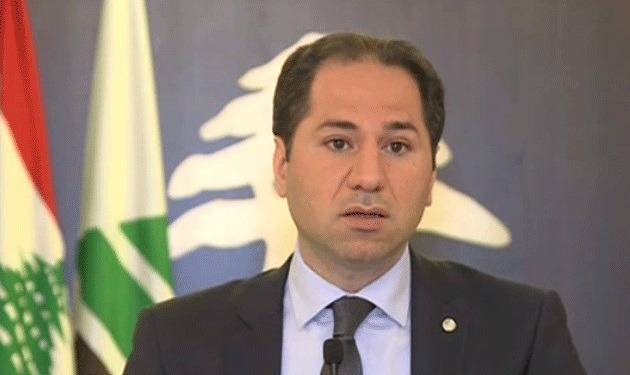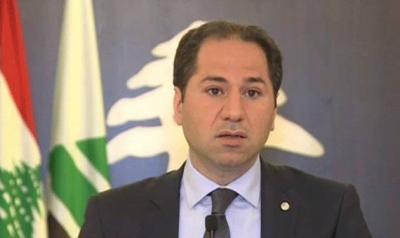Sami Gemayel, head of the Kataeb Party and a Member of Parliament, stated that the delay in forming the government is due to "internal power struggles on one hand, and an attempt by Hezbollah to use the Lebanese government as leverage in the Iranian confrontation with Arabs and the West."
In an interview with "Al-Ahram," he said, "The divisions among Lebanese parties exist on two levels: the first is between the majority of the Lebanese population on one side and the political-economic-security system that controls power and constitutional and legitimate institutions, as well as Lebanon's sovereign and non-sovereign decisions on the other. This division stems from the vast gap between the performance of this system and the vital interests, future aspirations, and political and living rights of the Lebanese people. The second level is the internal divisions within the system itself, which are caused by disagreements over power-sharing and deals, unrelated to the competition to meet the demands of the Lebanese people or differences in developmental, reformative, or economic projects and visions. The ongoing conflict within the pillars of the system focuses on ministerial, parliamentary, and administrative positions, the presidency, and who occupies these positions."
He stressed, "Lebanon indeed needs a process of reunification, but this process must be based on different foundations and concepts for political action than those followed by the pillars of the system. What exists today are deals, settlements, and distribution of positions, while what is needed is unification according to the correct democratic concept for reproducing power, periodically holding elections, ensuring the sovereignty of the Lebanese state, and applying the constitution and local and international laws."
When asked about the need to draft a new agreement, he responded that the Kataeb Party has a comprehensive vision for political reform. It has a clear project in this area because it believes that the existing system has failed to build a state that meets the aspirations of the Lebanese people. He emphasized that it is necessary for the Lebanese to agree on the foundations required for good governance, a constitutional and naturally democratic cycle, transparent management, and effective and civilized judicial, economic, and financial institutions. However, he noted that all these matters cannot be realized in the absence of fundamental and obvious principles represented by freedom, sovereignty, and independence.
He pointed out that today’s problem is the alliance between illegitimate arms and the ruling system, known to all, based on covering external projects and seizing sovereign decisions in exchange for a complex network of looting state and citizen resources. Thus, he believes that the entry point for any political reform and structural change in power is to secure the democratic atmosphere and freedoms required for the Lebanese people to elect a legislative authority that truly represents them and works for their future. From this authority, the executive power represented by the government and a president will emerge, tasked with implementing political reform based on free understanding among Lebanese through the natural and proper constitutional mechanisms, and not through matters imposed by illegitimate arms as a fait accompli, which constitutional institutions endorse within the framework of a new deal, like that which occurred during the presidential elections in 2016 or with the recent electoral law and the parliamentary elections of 2018 and prior government formations.
When asked who obstructed the implementation of the French initiative and why, Gemayel stated, "The French initiative impeded itself, especially since it excluded early parliamentary elections from the outset under pressure from Hezbollah, despite its launch on the basis of the necessity of holding these elections as a fundamental part of the solution. Once it strayed from the true principles required for a solution, the French initiative found itself trapped in the game of the system that controls power and has turned into a kind of cover for their known performance based on partitioning and size-sharing." He pointed out that "the French initiative started as a comprehensive political, economic, and rescue initiative, but due to being drained of its essence, it transformed into an initiative that addresses some technical details separate from the core solution."
Regarding his interpretation of Hezbollah’s recent speech and messages against Israel, he noted that "the escalation against Israel occupied the last two minutes of a speech that lasted over an hour and a half." He added, "This escalation reflects the party's decision to seize control over the state's levers, its institutions, and the Lebanese society, hence the threatening and escalating rhetoric directed by Nasrallah at political activists, media personnel, and eventually the political forces and figures opposing the party’s approach and projects."
On the distinction made by the Kataeb Party and the European Union between Hezbollah as a resistance movement and its political faction in parliament, he stated, "Formally, we do not link our position to the political stance or the interest of any international party but rather to Lebanon and its people, in compliance with Lebanese and international laws and the constitution. Hence, our position is clear that the responsibility of defending Lebanon and resisting any external threat lies solely with the Lebanese state through its legitimate constitutional institutions. Any activity outside the constitution and local and international laws is deemed illegal, and we categorically reject it."
As for the responsibility of the Free Patriotic Movement for the current economic situation, Gemayel viewed it as "part of the ruling system and still is." He said, "It has held sensitive ministries reeking of waste, corruption, and deals during its four years in the presidency. All these facts and more make it a key player in the current state of affairs in solidarity and cooperation with other partners in the presidential settlement."
In response to a question about potential scenarios if the head of the Free Patriotic Movement, Gebran Bassil, refuses to form a government led by Hariri, he remarked, "Lebanon is in a dangerous downward spiral, and any neglect of the Lebanese demands for a truly independent government is a waste of time. The obstacles imposed by the system are artificial and aimed at inflaming sectarian tensions in the country to maintain its influence a year before the parliamentary elections."
Regarding whether the alliance between the Free Patriotic Movement and Hezbollah could persist until the presidential elections, with Bassil running to succeed President Aoun, he noted, "There is a disagreement between Hezbollah and the Free Patriotic Movement, but it is not related to the essence of the famous Mar Mikhael Agreement signed in 2006, which covers the party's arms through the Movement's political or official position in power. The current disagreement is simply a game of tug-of-war and finger-pointing relating to Gebran Bassil’s attempts to secure Hezbollah's commitment to endorse his presidential candidacy to replace his uncle, General Michel Aoun. As is well-known, the topic of the presidency for Hezbollah is linked to regional and international considerations relevant to the party, not to the ambitions of MP Gebran Bassil. I do not believe that the Free Patriotic Movement is about to end its alliance with Hezbollah regardless of the disagreements, nor do I believe that Hezbollah will do so either."
He regrettably remarked, "The political system, particularly the Free Patriotic Movement, continues a policy of ceding sovereignty to Hezbollah in exchange for positions of power."
Regarding the recent events in Tripoli and whether there was external interference to obstruct Hariri rather than mere protests against deteriorating conditions, he stated, "In Tripoli and Lebanon, there is real hunger, and a people suffering from poverty and lack of state care, struggling and dying due to inability to receive medical treatment, while the system continues its policy of denial, refusing to recognize the reality, and tries to mislead local and international public opinion by portraying matters as if they are the result of external conspiracies. We do not deny the possibility of interference to exploit the people's anger, but the basis is the state's policy that neglects the Lebanese and focuses on securing the interests of the political, factional, party, personal, and authoritarian system."
In relation to the reasons behind the halt in the border demarcation process between Lebanon and Israel, he plainly stated, "Because it did not stem from Lebanon's interest nor was it built on the basis of Lebanese sovereignty, but rather orchestrated by Hezbollah to buy time ahead of the end of former U.S. President Donald Trump’s term. With Trump’s defeat in the recent elections, Hezbollah and the ruling system retreated from previous concessions and flexible policies, reverting to leveraging this file alongside others in the tug-of-war between Iran and the United States."
He added, "It is unfortunate that Lebanon today is a hostage, transformed into a bargaining chip, thus Lebanon currently lacks sovereignty and is unable to make any sovereign decision that considers its higher interests. Consequently, topics of regional and international negotiations, their outcomes, and paths are subject to the will of Iran and Hezbollah."
Concerning whether Lebanon has reverted to an era of political assassinations following the killing of Loukman Slim, Gemayel indicated that "it cannot be said that assassinations have returned but rather that they continue, as they have regrettably become a method of controlling Lebanon, silencing its people, terrorizing its leaders, and subjugating its state."




